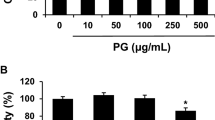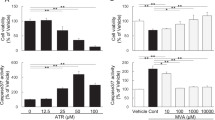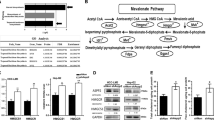Abstract
Modulation of cell growth by a combination of pravastatin [a 3-hydroxy-3-methylglutaryl-coenzyme A (HMG-CoA) reductase inhibitor] and d-limonene (an inhibitor of protein isoprenylation) was studied using Hep G2, a human hepatoma-derived cell line. Pravastatin, at 0.1 mM, produced 85% inhibition of cholesterol biosynthesis in Hep G2 cells. The combination of 0.1 mM pravastatin and 1.0 mM d-limonene had no further effect on the reduction seen with pravastatin alone. Addition of 0.1 mM pravastatin or 1.0 mM d-limonene did not significantly suppress DNA synthesis by the cells, whereas the combination suppressed it to 50% of the control level. Production of m-p21ras was markedly decreased to 35% of the control level by the combination of these two inhibitors. Both the reduction by pravastatin of farnesylpyrophosphate as substrate for protein:farnesyl transferase and inhibition of protein farnesylation by d-limonene seem to be responsible for the profound suppression of m-p21ras formation in the cells. However, dolichol synthesis was not suppressed by the combination of these inhibitors. In human fibroblasts, the combination suppressed m-p21ras production but not DNA synthesis. These findings suggest that the combination of pravastatin and d-limonene acts on cancer cell growth through inhibition of the post-translational processing of cellular proteins including p21ras, rather than through the suppression of cholesterol and dolichol biosynthesis. Thus, the combination of an HMG-CoA reductase inhibitor and an inhibitor of protein isoprenylation offers potential as a new approach for cancer therapy.
This is a preview of subscription content, access via your institution
Access options
Subscribe to this journal
Receive 24 print issues and online access
$259.00 per year
only $10.79 per issue
Buy this article
- Purchase on Springer Link
- Instant access to full article PDF
Prices may be subject to local taxes which are calculated during checkout
Similar content being viewed by others
Author information
Authors and Affiliations
Rights and permissions
About this article
Cite this article
Kawata, S., Nagase, T., Yamasaki, E. et al. Modulation of the mevalonate pathway and cell growth by pravastatin and d-limonene in a human hepatoma cell line (Hep G2). Br J Cancer 69, 1015–1020 (1994). https://doi.org/10.1038/bjc.1994.199
Issue Date:
DOI: https://doi.org/10.1038/bjc.1994.199
This article is cited by
-
Combination of tamoxifen and D-limonene enhances therapeutic efficacy in breast cancer cells
Medical Oncology (2023)
-
Response surface optimization of biocompatible elastic nanovesicles loaded with rosuvastatin calcium: enhanced bioavailability and anticancer efficacy
Drug Delivery and Translational Research (2020)
-
Cell signaling pathways in the mechanisms of neuroprotection afforded by bergamot essential oil against NMDA‐induced cell death in vitro
British Journal of Pharmacology (2007)
-
ras p21 isoprenylation inhibition induces flat colon tumors in Wistar rats
Diseases of the Colon & Rectum (2000)



